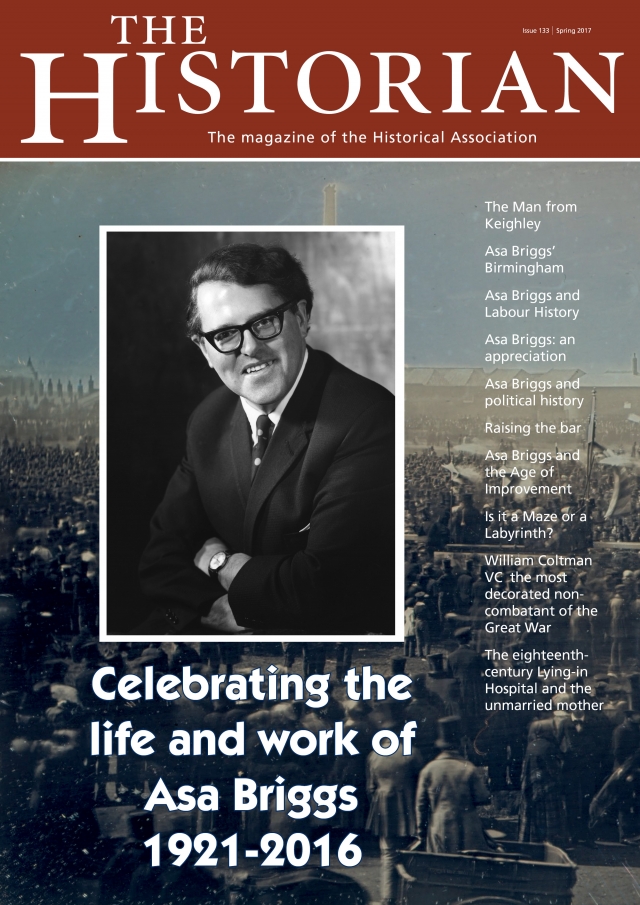The Historian 133: Out Now
Journal News

This edition of The Historian sets out particularly to celebrate the life of Asa Briggs. It focuses on his work and achievements as an historian, in the widest possible sense of being someone who shaped the discipline as well as inspiring others through his research, teaching and writing. This is not a Festschrift: it is offered as a series of reflections by various historians on how they were influenced by Asa Briggs.
Most historians will name a figure who has deeply influenced their work, either as teacher or writer, or indeed as mentor. The belief of the co-editors of this issue of The Historian is that Asa Briggs will be among the handful of the most prominent, possibly the most prominent of all.
One of your co-editors only ever heard Asa Briggs speak once: this was the occasion when the Historical Association gave him a special award at Senate House on the evening when Peter Hennessy received the Medlicott Medal. In a few minutes Asa Briggs, despite being ninety, captivated us and proved why he was the most influential and perspicacious historian of the age. His award that evening was to recognise his unique role in supporting the Historical Association so strongly throughout his professional life, as well as a personal tribute to his scholarship.
For this tribute to Asa Briggs the contributors are colleagues and fellow researchers, several of whom are well known historians themselves who, in their individual ways, pay tribute to this most prolific, creative and inspirational historian. What they say will speak individually but their collective commentary confirms the degree to which he had influenced a generation of researchers. To complement their very welcome and fulsome tributes, there are two short comments from two branch members who explain, as is the case for many of us, the degree to which Asa Briggs’ most celebrated, and used, textbook The Age of Improvement has influenced their studies and understanding.
Asa Briggs’s reputation as an energetic scholar and activist has produced its own mythology. In his obituary to Asa Briggs, offered in The Historian last year (no. 129, Spring 2016), Professor Donald Read mentioned that, when Asa Briggs was professor at Leeds University, the departmental secretary was often to be found hovering on the station platform to secure signatures on letters and papers as he rushed through, always on his way somewhere. This is matched by the story that he wrote a book review half an hour before his wedding, and another that he read a book, and reviewed it, on an hour-long express train journey from London Victoria to Brighton. So busy was he that many wondered how he found time to sleep or indeed whether he did at all. Mythology and legend always follow essential truths: in this case that he was truly prolific and creative, and, with full justification, the most celebrated historian of our time.
We are extremely grateful to all our contributors who have, as always, given freely of their time and devoted their skills to The Historian. Several have shared their thoughts about Asa Briggs with us but we also have three further items which reflect the full range of the Historical Association’s interests: a further item to extend our commemoration of the Great War, an article on a particular aspect of women’s history and an exploration of a social and environmental phenomenon.
The full range of what we offer is encompassed by our rarely used Latin motto – quidquid agunt homines – which is
broadly translated as ‘whatever mankind does’. This itself would be a ready motto to have to mind as we complete our tribute to Asa Briggs because in many ways that phrase reflected his historical range and enthusiasms.
Attached files:
- The Historian 133
2.65 MB PDF document

